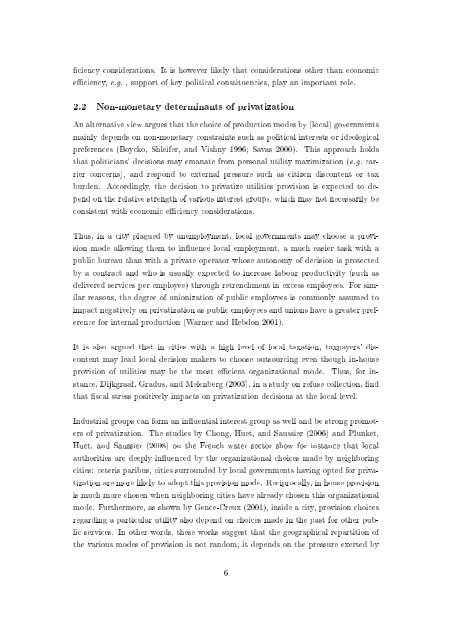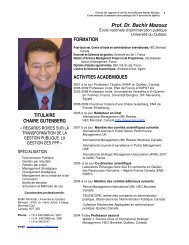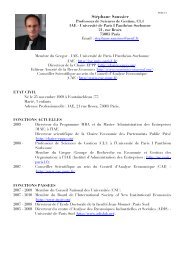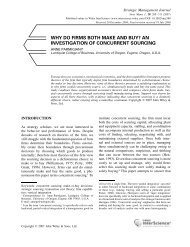Make or Buy Urban Public Transport Services: A Rational Choice?
Make or Buy Urban Public Transport Services: A Rational Choice?
Make or Buy Urban Public Transport Services: A Rational Choice?
You also want an ePaper? Increase the reach of your titles
YUMPU automatically turns print PDFs into web optimized ePapers that Google loves.
ciency considerations. It is however likely that considerations other than economic<br />
eciency, e.g. , supp<strong>or</strong>t of key political constituencies, play an imp<strong>or</strong>tant role.<br />
2.2 Non-monetary determinants of privatization<br />
An alternative view argues that the choice of production modes by (local) governments<br />
mainly depends on non-monetary constraints such as political interests <strong>or</strong> ideological<br />
preferences (Boycko, Shleifer, and Vishny 1996; Savas 2000). This approach holds<br />
that politicians' decisions may emanate from personal utility maximization (e.g. carrier<br />
concerns), and respond to external pressure such as citizen discontent <strong>or</strong> tax<br />
burden. Acc<strong>or</strong>dingly, the decision to privatize utilities provision is expected to depend<br />
on the relative strength of various interest groups, which may not necessarily be<br />
consistent with economic eciency considerations.<br />
Thus, in a city plagued by unemployment, local governments may choose a provision<br />
mode allowing them to inuence local employment, a much easier task with a<br />
public bureau than with a private operat<strong>or</strong> whose autonomy of decision is protected<br />
by a contract and who is usually expected to increase labour productivity (such as<br />
delivered services per employee) through retrenchment in excess employees. F<strong>or</strong> similar<br />
reasons, the degree of unionization of public employees is commonly assumed to<br />
impact negatively on privatization as public employees and unions have a greater preference<br />
f<strong>or</strong> internal production (Warner and Hebdon 2001).<br />
It is also argued that in cities with a high level of local taxation, taxpayers' discontent<br />
may lead local decision makers to choose outsourcing even though in-house<br />
provision of utilities may be the most ecient <strong>or</strong>ganizational mode. Thus, f<strong>or</strong> instance,<br />
Dijkgraaf, Gradus, and Melenberg (2003), in a study on refuse collection, nd<br />
that scal stress positively impacts on privatization decisions at the local level.<br />
Industrial groups can f<strong>or</strong>m an inuential interest group as well and be strong promoters<br />
of privatization. The studies by Chong, Huet, and Saussier (2006) and Plunket,<br />
Huet, and Saussier (2008) on the French water sect<strong>or</strong> show f<strong>or</strong> instance that local<br />
auth<strong>or</strong>ities are deeply inuenced by the <strong>or</strong>ganizational choices made by neighb<strong>or</strong>ing<br />
cities: ceteris paribus, cities surrounded by local governments having opted f<strong>or</strong> privatization<br />
are m<strong>or</strong>e likely to adopt this provision mode. Reciprocally, in house provision<br />
is much m<strong>or</strong>e chosen when neighb<strong>or</strong>ing cities have already chosen this <strong>or</strong>ganizational<br />
mode. Furtherm<strong>or</strong>e, as shown by Gence-Creux (2001), inside a city, provision choices<br />
regarding a particular utility also depend on choices made in the past f<strong>or</strong> other public<br />
services. In other w<strong>or</strong>ds, these w<strong>or</strong>ks suggest that the geographical repartition of<br />
the various modes of provision is not random; it depends on the pressure exerted by<br />
6





